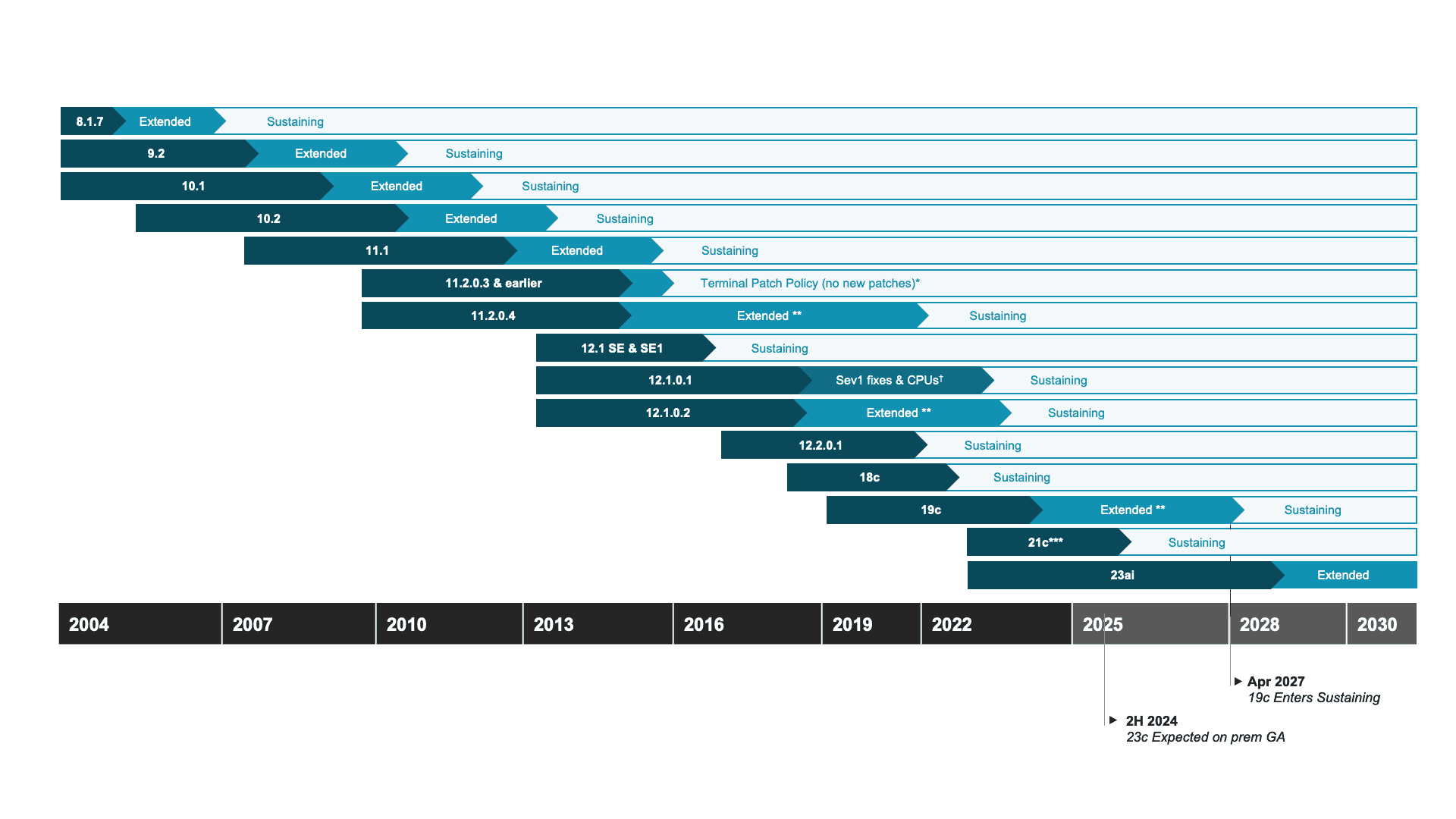
Are you an Oracle Database customer facing Oracle Sustaining Support or Restricted Upgrade Support status? Unsure of what this means for your organization? We’re here to demystify so you can make the best decisions for your IT roadmap and budget.
Software support contracts generally don’t age well. It seems to be part of the modern vendor playbook to discourage you from using your highly configured, paid-for software so they cut back on support services. Meanwhile, you’re expected to progressively pay more for less support, and add to your budget to address the gap.
That’s the situation facing many Oracle Database customers who, despite the vendor’s guarantee of lifetime support, often find themselves relegated to Oracle Sustaining Support status.
According to Oracle’s support policy, you can indefinitely stay on Sustaining Support, for the same price of the approximately 22% annual maintenance fee, but Oracle licensees are no longer provided with new program updates, new fixes, new security alerts, new critical patch updates or previously released fixes or updates that the company no longer supports.
Why? The speculation is that Oracle, like many enterprise software providers, is seeking to shift customers away from on-premises systems and toward software-as-a-service and cloud-based solutions. And with the latest numbers coming in from recent surveys and reports, and even according to statements to shareholders how cloud pricing errs on the favor of the vendor, clarity on what support model is best for your business will help you make the wisest decisions for your organization.
What are Oracle Support levels?
To help set the context, let’s look at an overview of the support tiers:
- Premier Support: Premier Support is typically available for the database product starting from the date it becomes generally available for a period of five years. Premier Support includes regular (generally quarterly) product updates which include bug fixes and security updates as well as the ability to freely upgrade to newer versions of the Oracle Database product. Premier Support allows you to create database bug reports and at their discretion, Oracle may be willing to create one-off bug fixes. The cost for Premier Support typically starts at 22% of the annual license fee which is then adjusted annually for inflation. In 2023 this annual increase was around 8%.[1]
- Extended Support: Expands support for an additional three years for specific software releases for customers willing to pay extra. The cost of Extended Support can be anywhere between 10-20% more than Premier support, though there have been times in the past that Oracle has waived the cost of Extended Support for various reasons.
- Sustaining Support: This level of support is designed to provide on-going minimal support for older Oracle Database product versions that are not eligible for Premier or Extended support. This level of support is available for as long as you continuously maintain and pay the annual fees for technical support for your Oracle program licenses. Sustaining Support is really a bare bones form of on-going support for Oracle Database which does not include new bug fixes or security and product patches.
- Upgrade Support (US): A new kind of support specific to Oracle Database 11.2 (retroactively), 12.1 and 12.2. Customers must contact Oracle to apply for US support. If approved, customers will have US support until the end of 2024 to motivate them to upgrade to Oracle Database 19c. US support is provided by Oracle Customer Success Services (CSS), not Oracle Support. The cost for Upgrade Support can vary since this is serviced through CSS.
[1] Oracle Support Renewal – Optimization And Lower Costs (redresscompliance.com)

Oracle support options may not align with your needs, but you’ve got options
Many organizations have determined their existing release serves their business needs and will continue to serve their needs for years to come. They trust Rimini Street – the global leader in third-party support, to be their preferred and trusted partner to help them maximize the value and useful life of their database with guaranteed support availability for an additional 15 years from the date of contract.
This includes proactive security protection, a dedicated primary support engineer with an average of 20 years of experience, backing by a global team of experts, local language support, AI-patented tools and processes to help resolve cases 23% faster, average less than 2 minute response time for priority cases – all at up to 50% off the cost of annual support.
As the market leader of end-to-end software support and services including managed, consulting, security, monitoring, integration and more, leading companies are benefitting from offloading their day-to-day software maintenance responsibilities to Rimini Street while partnering with Rimini to help reach their organization’s growth and profitability goals. This puts them at a great advantage to free up funds and resources to focus on innovation and competitive advantage.
Don’t just sustain your Oracle roadmap. Get ahead by choosing the Rimini Smart Path™.
Learn more: Discover how to move towards maximizing the value of your Oracle Database investments, reducing overall IT costs, and getting more responsive support with Rimini Street support and services for Oracle.
You may also like:
- Read: 3 Smart Paths to Innovation for Your Oracle Roadmap
- Watch: Rimini ONE™ overview
- Solution: Rimini Support™ for Oracle
